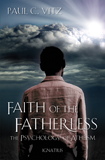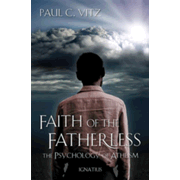Atheists have sometimes challenged theists by claiming that religion is only an invention of those who have psychological needs; God is merely “a product of man’s desire for security.” Psychologist Paul C. Vitz presents an opposing view—that because of psychological issues, atheists reject the existence of God. That is, atheists tend to disbelieve in God for psychological reasons rather than rational reasons. As Vitz explains, “[A] child’s psychological representation of his father is intimately connected to his understanding of God….” and “an atheist’s disappointment in and resentment of his own father unconsciously justifies his rejection of God” ( p. 18). According to Vitz, situations that might cause a child to have a negative view of his or her father—situations such as the early death of the father, lack of father figures in a child’s life, an abusive father, or even a distant, weak, or cowardly father—predispose a person toward a rejection of God. In Faith of the Fatherless, Vitz presents and defends this defective father hypothesis.
I know that some Christians with an evangelical outlook have been aware of this “spiritual impediment” for many years. Now, Vitz provides strong psychological and historical evidence for the reality of the defective father hypothesis that should be taken into consideration by anyone who has a heart for those who are spiritually lost. It’s also a potent reminder for fathers raising children of how critical it is for a child’s spiritual health that they express their love to their children.
In Faith of the Fatherless, Vitz introduces his hypothesis then marshals his evidence. In the first chapter, “Intense Atheism,” Vitz explains the psychological issues that he thinks underlie intense atheism. He discusses projection theory, the Oedipus complex, and attachment insecurity as elements that contribute to his defective father hypothesis. Vitz doesn’t claim that his hypothesis applies in every situation, but he does believe that the examples and evidence are so plentiful that it seems to be true in at least 50 percent of the cases.
Vitz defends his hypothesis with biographical investigations of both atheists and theists. In chapter two, he begins with atheists whose fathers died while they were children: Friedrich Nietzsche, David Hume, Bertrand Russell, Jean-Paul Sartre, Albert Camus, and Arthur Schopenhauer. Then he shifts to atheists with weak and abusive fathers: Thomas Hobbes, Voltaire, and Sigmund Freud among others. He also deals separately with contemporary atheists such as Richard Dawkins, Daniel Dennett, and Christopher Hitchens.
In the third chapter he buttresses his argument with evidence demonstrating that a significantly larger number of theists grew up with effective rather than defective fathers, or at least an effective father figure in their lives. He points out how loving father-son relationships make it more likely that the son will embrace a loving relationship with God.
He adds “Further Evidence and Qualifications” in chapter four, including a discussion regarding women since he has dealt exclusively with men up to that point. In the fifth chapter he expands into additional factors that influence those who choose atheism, factors such as social influences, personal independence, and personal convenience.
Chapter six offers an interesting look at autism, considering the fact that those with autism generally have more difficulty with interpersonal relationships. Autism in itself can make forming relationships with people difficult, and it seems to have a similar effect on forming a relationship with God.
I reviewed the newly published 2013 edition of this book, but the first edition was published in 1999. This second edition is significantly different from the first and is certain to be even more helpful. The biographical sketches now include some of the most prominent of our modern-day, militant atheists. The inclusion of a discussion of autism and its effect on faith is fascinating and timely since the diagnosed cases of autism have risen so dramatically. Also, recent research regarding children’s attachment to parental figures provides scientific evidence that helps to support Vitz’s hypothesis.
While the first chapter seems a little more challenging to read because of the discussion of psychology, the rest of the book is generally easy to read since much of it is presented through biographical stories. I would recommend Faith of the Fatherless to anyone with an evangelical outlook since we must understand the very real barriers that some people must overcome before they can embrace a relationship with a God who is their loving Father.










